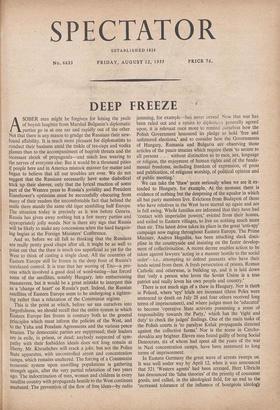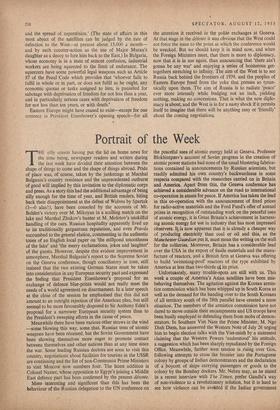DEEP FREEZE •
ASOBER man might be forgiven for letting the peals of boyish laughter from Marshal Bulganin's diplomatic parties go in at one ear and rapidly out of the other. Not that there is any reason to grudge the Russians their new- found affability. It is much more pleasant for diplomatists to conduct their business amid the tinkle of tea-cups and vodka glasses than to the accompaniment of boorish threats and the incessant shriek of propaganda—and much less wearing to the nerves of everyone else. But it would be a thousand pities if people here and in America mistook manner for matter and began to believe that all our troubles are over. We do not suggest that the Russians necessarily have some diabolical trick up their sleeves; only that the lyrical reaction of some part of the Western press to Russia's joviality and President Eisenhower's optimism must be successfully obscuring from many of their readers the uncomfortable fact that behind the smile there stands the same old tiger straddling half Europe. The situation today is precisely as it was before Geneva. Russia has given away nothing but a few merry parties and appropriately jolly words. Nor is there any sign that Russia will be likely to make any concessions when the hard bargain- ing begins at the Foreign Ministers' Conference.
And so, before we all fall to thinking that the Russians are really pretty good chaps after all, it might be as well to point out that the thaw is much too superficial as yet for the West to think of casting a single clout. All the countries of Eastern Europe still lie frozen in the deep frost of Russia's unrelaxed control. It is true that her wooing of Tito—a pro- cess which involved a good deal of word-eating—has forced some of the satellites, notably Hungary, into embarrassing manoeuvres, but it would be a great mistake to interpret this as a 'change of heart' on Russia's part. Indeed, the Russian satellites of Eastern Europe seem to be undergoing a tighten- ing rather than a relaxation of the Communist regime.
This is the point at which, before we sun ourselves into forgetfulness, we should recall that the entire system in which Eastern Europe lies frozen is contrary both to the general principles which must inform the policies of the West, and to the Yalta and Potsdam Agreements and the various peace treaties. The democratic parties are suppressed: their leaders are in exile, in prison, or dead; anybody suspected of sym- pathy with their forbidden ideals does not long remain at liberty. Mr. Khrushchev will crack a joke, but not the Police State apparatus, with uncontrolled arrest and concentration camps, which remains unaltered. The forcing of a Communist economic system upon unwilling populations is gathering strength again, after the very partial relaxation of two years ago. The indoctrination of men, women and children in every satellite country with propaganda hostile to the West continues unabated. The prevention of the flow of free ideas—by radio jamming, for example —has never ceased. Now that war has been ruled out and a return to diplom“cy generally agreed upon, it is relevant once more to remind ourselves how the Polish Government honoured its pledge to hold 'free and unfettered elections,' and to consider how the Governments of Hungary, Rumania and Bulgaria are observing those articles of the peace treaties which require them 'to secure to all persons . . . without distinction as to race, sex, language or religion, the enjoyment of human rights and of the funda- mental freedoms, including freedom of expression, of press and publication, of religious worship, of political opinion and of public meeting.'
We can take the 'thaw' more seriously when we see it ex- tended to Hungary, for example. At the moment there is evidence of nothing but the deepening of the squalor in which all but party members live. Evictions from Budapest of those who have relatives in the West have started up again and are in full swing. Whole families are informed that they have had `contact with imperialist powers,' evicted from their homes, and exiled to Eastern villages, to live on nothing much more than air. This latest drive takes its place in the great 'anti-spy' campaign now raging throughout Eastern Europe. The Prime Minister, Andros Hegedus, has been attacking slack disci- pline in the countryside and insisting on the faster develop- ment of collectivisation. A recent decree enables action to be taken against lawyers 'acting in a manner hostile to the social order'—i.e., attempting to defend peasants who have their lands seized from them. A fresh persecution of priests, Roman Catholic and otherwise, is building up, and it is laid down that 'only a person who loves the Soviet Union is a true patriot and really loves his own people and country.'
There is not much sign of a thaw in Hungary. Nor is therb in Poland, where 'spy' trials are incessant (three Poles were sentenced to death on July 28 and four others received long terms of imprisonment), and where judges must be 'educated' to become 'operative State activists possessing a sense of responsibility towards the Party,' which has the 'right and duty' to check the judges' findings. One of the main tasks of the Polish courts is 'to paralyse Kulak propaganda directed against the collective farms.' Nor is the scene in Czecho- slovakia any brighter. Eleven men found guilty of being Social Democrats, six of whom had spent all the years of the war in Nazi concentration camps, have been sentenced to long terms of imprisonment.
In Eastern Germany the great wave of arrests sweeps on. It was well under way by April 12, when it was announced that 521 'Western agents' had been arrested. Herr Ulbricht has denounced the 'false theories' of the priority of consumer goods, and called, in the ideological field, for an end to the `increased tolerance of the influence of bourgeois ideology and the spread of superstition.' (The state of affairs in this most abject of the satellites can be judged by the rate of defection to the West—at present about 15,000 a month— and by such counter-action as the use of Major Murau's daughter as a decoy to lure him back to the East.) In Bulgaria. whose economy is in a state of utmost confusion, industrial workers are being squeezed to the limit of endurance. The squeezers have some powerful legal weapons such as Article 87 of the Penal 'Code which provides that 'whoever fails to fulfil in whole or in part, or does not fulfil as he ought, any economic quotas or tasks assigned to him, is punished for sabotage with deprivation of freedom for not less than a year, and in particularly serious cases with deprivation of freedom for not less than ten years, or with death.'
Eastern Europe might have ceased to exist—except for one sentence in President Eisenhower's opening speech—for all the attention it received in the polite exchanges at Geneva. At that stage in the détente it was obvious that the West could not force the issue to the point at which the conference would be wrecked. But we should keep it in mind now, and when the Foreign Ministers meet, that there is more to diplomacy, now that it is in use again, than announcing that 'there ain't gonna be any war' and enjoying a series of boisterous get- togethers stretching to infinity. The aim of the West is to see Russia back behind the frontiers of 1939. and the peoples of Eastern Europe freed from the yoke that presses so tyran- nically upon them. The aim of Russia is to radiate 'peace' ever • more intensely while budging not an inch, yielding nothing, making no concessions. That is what the new diplo- macy is about, and the West is in for a nasty shock if it permits itself to imagine that there will be anything easy or 'friendly' about the coming negotiations.



































 Previous page
Previous page